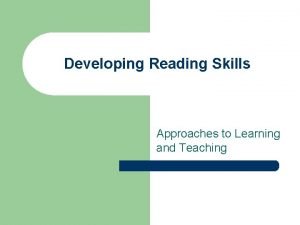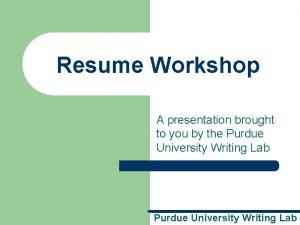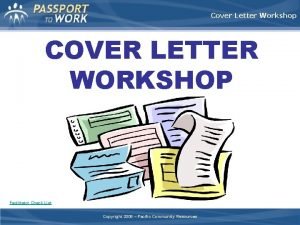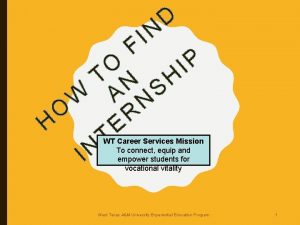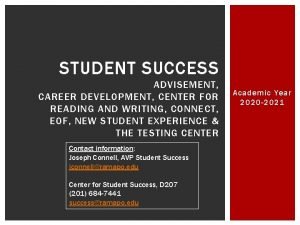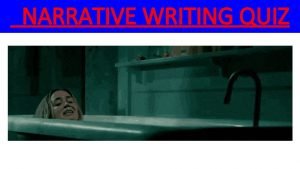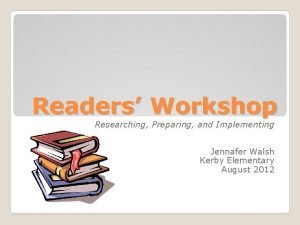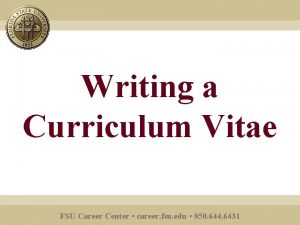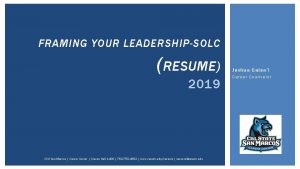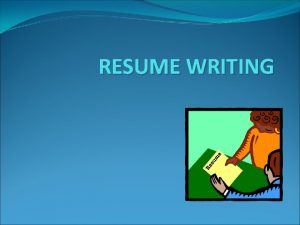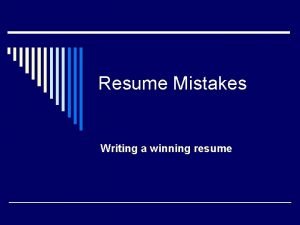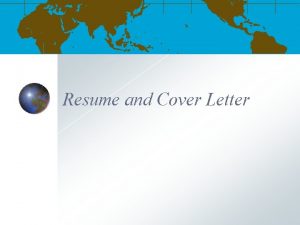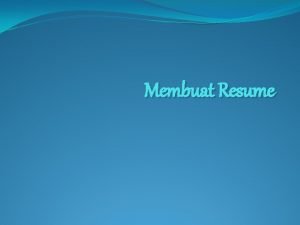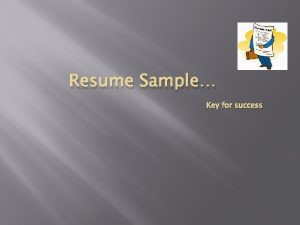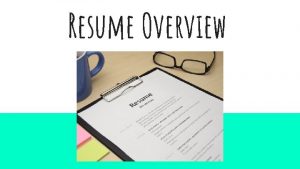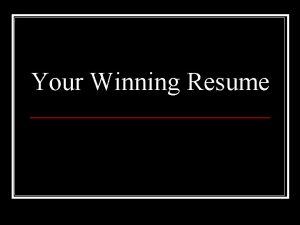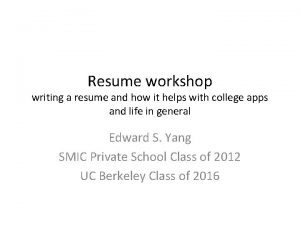The Writing and Reading Center Resume Writing Workshop











- Slides: 11

The Writing and Reading Center Resume Writing Workshop

What is a Résumé? ● It is a structured, written summary of your educational and employment background that shows your qualifications for a job.

A Good Résumé: …builds the reader’s interest, calls attention to your best features and downplays your weaknesses, without distorting or misrepresenting the facts. ● ● ● ● A good résumé shows that a candidate Thinks in terms of results Knows how to get things done Is well rounded Shows signs of progress Has personal standards of excellence Is flexible and willing to try new things Possesses strong communication skills

To give Your Résumé a Sharp Look: ● ● ● Use a clean typeface on high-grade, letter-size bound bond paper Make sure that your stationary and envelope match Leave ample margins all around Avoid italic typefaces, which can be difficult to read Use quality laser printer Break up the text by using headings that call attention to the various aspects of your background, such as your work experience and education. Underline or capitalize those headings, or set them off in the left margin. Use indented lists to itemize your most important qualifications Leave plenty of white space, even if this forces you to use two pages Write in a simple and direct style Use short, crisp phrases Focus on what your reader needs to know Absolutely avoid using the word I. Instead use action verbs.

Résumé Action Verbs: Accomplished achieved administered advised approved arranged assisted audited assumed budgeted changed calculated chaired collected completed compounded compiled detected interpreted purchased determined interviewed realized developed invented received devised lectured recommended diagnosed led recorded directed logged recruited discovered maintained reduced distributed managed referred documented mediated rendered drew up monitored represented debated negotiated researched edited obtained restored evaluated operated reviewed examined ordered scheduled expanded organized selected formulated oversaw served facilitated performed solved

More Action Verbs ● ● ● ● construed founded planned conducted generated presented conserved guided processed coordinated implemented produced counseled improved promoted created increased provided delivered installed publicized designed instituted published studied supervised taught tested trained worked wrote

Résumé Content ● Name and address The opening section should show at a glance *Who you are *How to reach you ● Career Objective or Summary of qualifications If you want to state your objective, make sure it is effective and be as specific as possible about what you want to do. However, many experts argue that your objective will be obvious from your qualifications and that stating your objective will only limit you as a candidate (especially if you would like to be considered for a variety of openings) because it labels you as interested in one thing. Keep in mind that the career objective or summary may be the only section read fully by the employer, so make it strong, concise, and convincing.

● Education If you’re still in school, education is probably your strongest selling point. So present your educational background in depth, choosing facts that support your “theme. ” State your major and minor fields of study, significant skills and abilities you have developed in your coursework, and the degrees or certificates you have earned. You can also include as heading for “Awards and Scholarships, ” if you so choose. Also if you have a GPA of 3. 00 and higher, be sure to mention the scale, especially if a 5 -point scale is used instead of a 4 -point scale. However, education is usually given less emphasis in a résumé after you have worked in your chosen field for a year or more. If work experience is your strongest qualification, save the “education” section later in the résumé and provide less detail.

● Skills Include information about: *Command of other languages *Computer expertise ● Activities and Achievements Your résumé should describe any volunteer activities that demonstrate your abilities. List projects that require leadership, organization, teamwork, and cooperation. List skills you learned in these activities, and explain how these skills are related to the job you’re applying for. If your activities have been extensive, you may want to group them into divisions such as “College activities, ” “Community Service, ” “Professional associations, ” “Seminars , Conferences, and Workshops, ” and “Speaking Activities. ” Or you can divide them into two categories: “Service Activities” and “Achievements, Awards, and Honors. ” Include speaking, writing, or tutoring experience; participation in athletics or creative projects; fund-raising or community service activities; and offices held in academic or professional organizations.

● Work Experience When describing your work experience, list your jobs in chronological order, with the current or last one first. Include any part-time, summer, or intern positions even if the jobs have no relation to your current career objective. It is important that you establish that you have the ability to get and hold a job, which is a qualification employers are looking for. Each job listing should include the name and location of the employer. Then, if the reader is unlikely to recognize the organization, briefly describe what it does. If an organization’s name or location has changed, state the present name or location, then the former: “formerly known/located …” Also state your functional job title. You should also state how long you worked on each job. Use the phrase “to present” to denote current employment. Also if a job was part-time, say so. Facts about your skills and accomplishments are the most important information you can give a prospective employer, so quantify them whenever possible, for example: *Designed a new ad that increased sales by 9% *Raised $2500 in 15 days for cancer research *Taught three Business Communications classes *Tutored at the Writing & Reading Center

● References You may include a section for references and simply put “References available upon request” at the end of your résumé. Then you can list your references on a separate sheet and bring them to your interview. References Bove e, Courtland L. , John V. Thill, and Barabara E. Schatzman. Business Communications Today. “Chapter 17: Writing Résumés and Application Letters. ” 7 th ed. USA: Prentice Hall, 1997. Lannon, John M. Technical Communication. 8 th ed. Wesley Educational Publishers Inc. , 1997. Part III. Résumés for the Online Job Search. “Chapter 9: The Web Based Résumé. ”
 Pre reading while reading and post reading activities
Pre reading while reading and post reading activities Mountain jacks lafayette indiana
Mountain jacks lafayette indiana Community facilitator cover letter
Community facilitator cover letter Handshake wtamu
Handshake wtamu Center for reading and writing ramapo
Center for reading and writing ramapo Personal narrative quiz
Personal narrative quiz Pros and cons of reading workshop
Pros and cons of reading workshop Cum laude meaning
Cum laude meaning Hiatt career center appointment
Hiatt career center appointment Csusm career center
Csusm career center Fleishman center resume
Fleishman center resume Reading workshop for parents
Reading workshop for parents
